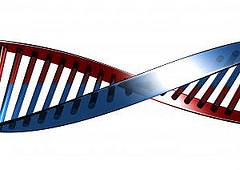
Sometimes the U.S. health care system can seem stuck in the last century: overly centralized, bureaucratic, and definitely not consumer-friendly.
But behind the scenes a scientific revolution is taking shape that will likely transform medicine, even if the administrative side of the industry isn’t quite ready for it.
The latest example of this emerging trend is the rebirth this month of 23andMe, a Silicon Valley start-up that gives consumers an affordable peek at their DNA.
The company was all but shut down two years ago when the U.S. Food and Drug Administration accused it of selling unlicensed medical devices.
The FDA said the combination of a “spit kit” that allows customers to submit a saliva sample and the company’s analysis of those samples required federal approval. Before the FDA stepped in, 23andMe was using the results to tell people whether their genes left them more or less likely to have certain diseases, from Alzheimer’s to breast cancer.
Now the company has approval for a more limited service, which mainly tells customers whether they have a “carrier gene” that could lead them to pass a genetic disease on to their children. The firm is still working with the FDA to gain approval for reports that detail health risks among those who submit their DNA samples.
The company’s regulatory struggle is a key battle in the effort to empower consumers with information they need to better understand, and control, their health.
But another aspect of 23andMe might be even more important. The firm asks its customers to allow their DNA to be shared with (or sold to) researchers, along with their answers to questions about their health and health habits.
The company has said that 80 percent of its customers have agreed to share their data. And with an estimated 1 million customers and counting, 23andMe is building a massive trove of information that should help researchers isolate which genes and mutations are responsible for causing, or preventing, particular diseases.
That data is already drawing interest from biotech firms. Earlier this year Genentech Inc. paid 23andMe $10 million for access to 3,000 “spit samples” of customers with Parkinson’s Disease as part of an effort to find new treatments for the disease. And that’s likely to be just the first of many such partnerships.
Another example of big data fueling research comes from the Kaiser Permanente health plan, which has received DNA samples form more than 100,000 Northern California older adults along with medical records and detailed survey answers about their health and lifestyle.
The Kaiser project, funded by the National Institutes of Health and conducted in a partnership with UC San Francisco, has already generated several research papers published in the journal Genetics. Researchers are also matching the patient information to environmental data to look at the way a person’s genes help determine or reveal how their bodies are affected by pollution over time.
The databases that Kaiser and 23andMe are building give researchers almost instant access to information that once would have taken years to assemble, if it could be done at all. And at least in the case of Kaiser, the genetic database is updated in real time to reflect changes in the health of the participants, making it even more valuable.
The science of medicine, in other words, is doing pretty well. Even if the practice of medicine remains hamstrung by rules and relationships better suited to the industrial than the digital age.
Daniel Weintraub is editor of The California Health Report at www.healthycal.org





